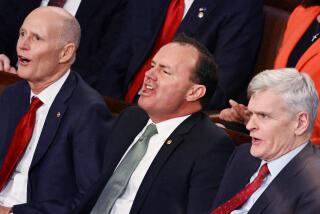Senate Democrats to Offer New Health-Care Proposal : Congress: The plan would require all companies to provide medical insurance for their workers or pay a tax on their payroll.
- Share via
WASHINGTON — Senate Democrats will unveil an ambitious package of health-care legislation today that would require all companies to offer their workers health insurance or pay a tax that could range as high as 8% of their total payroll.
Under the “pay-or-play” idea, all companies with more than 100 workers would be required to provide health insurance immediately or pay the new tax. Firms with fewer than 100 employees would be given a phase-in period, ranging up to five years, in which to comply.
Revenues from the new tax would be used to create a federal program called AmeriCare, which would provide health coverage for the unemployed and the poor. The current Medicaid program for the poor covers fewer than half of Americans living below the poverty line, which is listed at $13,360 a year for a family of four.
The legislation would specify a basic package of benefits, covering physicians’ services and hospital care, that would cover all Americans.
It also calls for creation of a National Health Care Expenditure Board, which would establish voluntary targets, both at the national and state levels, for health-care outlays. Businesses would negotiate with doctors and hospitals in an effort to control costs. But there is no specific system for curbing the growth in medical costs, which have been rising steadily at more than 10% a year despite a slowdown in inflation during the 1980s.
There is little chance that Congress will enact such a program this year, given the determined opposition of the Bush Administration and the politically powerful small-business lobby. But the proposal, which bears the endorsement of some of the Senate’s most powerful Democrats, will give a new impetus to discussions of the nation’s health-care crisis.
The United States currently spends 12% of its total economic output on health care, but more than 30 million Americans still have no health insurance.
The health plan was drawn up by Senate Majority Leader George J. Mitchell of Maine, and Sens. Edward M. Kennedy of Massachusetts, Donald W. Riegle Jr. of Michigan and John D. (Jay) Rockefeller IV of West Virginia.
The Bush Administration has two major studies of health care under way and will probably offer its own plan next year, Budget Director Richard G. Darman said. But the Administration would not accept legislation that forces businesses to provide coverage for their employees.
The White House favors a “market-oriented” approach, or finding ways to encourage companies and individuals to buy insurance voluntarily. The Democratic approach, however, presumes that the only way to protect all Americans is through mandatory coverage.
Business groups, informed about the Senate Democratic plan before its formal unveiling, were strongly skeptical.
“The mere fact that there is a mandate makes it unacceptable to us,” said John Paul Galles, executive vice president of Small Business United, a trade association. “We find it terribly unfortunate they would mandate that (companies) make payments for employees without limits on what physicians and hospitals charge for services.”
The Senate Democrats “go a long way beyond previous legislative proposals to identify costs and encourage containment, but there are no real restraints,” Galles added.
“We continue to question how the pay-or-play approach will help the working poor who lack health coverage and whose very jobs are likely to disappear in the face of such a significant new federal mandate,” said Howard Weizmann, executive director of the Assn. of Private Pension and Welfare Plans. “Pay-or-play is still a mandate, no matter what you call it.”
Liberal groups anxious for government action on health care were enthusiastic about the plan.
Ron Pollack, executive director of Families USA Foundation, praised Mitchell while lambasting President Bush.
“There are two Georges in Washington,” he said. “One George has provided bold leadership in the struggle to help America’s critically ill health-care system. The other George has not. At one end of Pennsylvania Avenue, there is a thoughtful proposal. At the other end, there is silence.”
More to Read
Get the L.A. Times Politics newsletter
Deeply reported insights into legislation, politics and policy from Sacramento, Washington and beyond. In your inbox twice per week.
You may occasionally receive promotional content from the Los Angeles Times.










